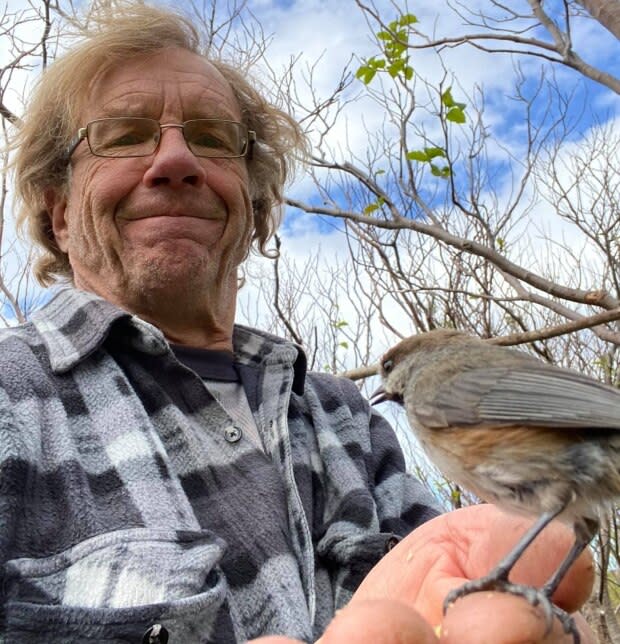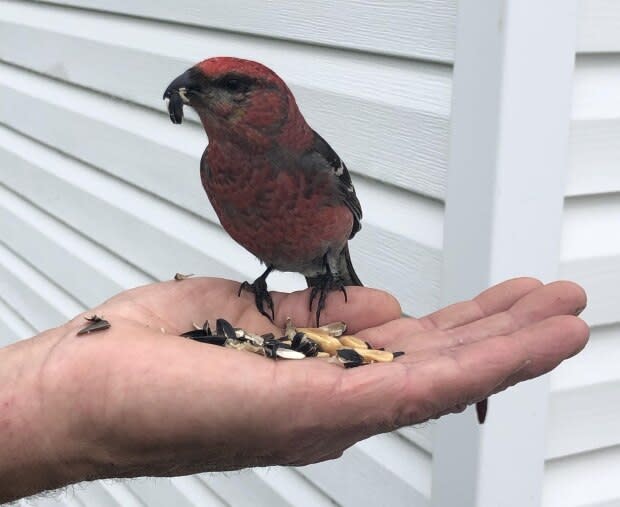After a violent trauma, birds have become this Twillingate man's 'saving grace'

The pine grosbeak that lands in his hand, and interrupts the interview, is named "Mom."
Randy Jenkins recognizes her immediately, with the small white feather just behind her right eye.
She's a frequent visitor to his Twillingate backyard, and earned her nickname for her habit of bringing her fledglings to the backyard, too. It's happened three years in a row.
Her current mate — Jenkins suspects — follows close behind, and lands on the microphone just a few seconds later. But Mom eats right out of Jenkins's hand.
"This is the one that's been here for five years. She returns every spring."
He adds, "It's a passion now … It's a lifesaving passion for me."
Jenkins is not being overly dramatic. He moved to Newfoundland after the trauma of a 1994 murder and robbery at the Oshawa, Ont. sporting goods store where he worked. The shooting left his boss dead and Jenkins wounded, his life turned upside down.
Decades later, Jenkins has rebuilt a new life in Twillingate, a historic fishing community on Newfoundland's northeast coast.
His life is considerably different. All Jenkins has to do is extend his left hand into the air, and Mom arrives. The yard is filled with birds, and some, particularly the young ones, are more reluctant.

"They'll get off my hand and almost flutter like a hummingbird, nervous to land," he said. "Where the older ones, they know me."
Over the winter, and during the spring, Jenkins will burn through an "unbelievable" amount of bird feed. He's built a custom feeder, cat and squirrel resistant, with four-inch ABS pipe.
When you get a grasp of what really happened, you understand how important they are to me. - Randy Jenkins
He once counted 26 birds in the yard, around his feeder — and around him — at once.
He'll talk to the birds, too. And he's sure they're talking back.
"The birds have become a saving grace," he said in an interview.
Smiling again
Mom is a bit of a star online, too — on a Facebook group where Jenkins shares dozens of photos of the birds he finds near his home.
The Newfoundland and Labrador Birdwatching Group has grown to 10,000 people, and his posts will usually get hundreds of reactions, and dozens of comments.
"I wish everybody could have a friend like you," he tells Mom in one of the videos, as the bird picks at feed on a wooden plank. The comments — a blend of "beautiful," "sweet," and awesome!" — are a delight.
Jenkins said many people are amazed that the birds will land straight in his hand.
"You don't think it's going to go anywhere, and at the end of the day you look at it, and you've got over 100 loves on it. Not just likes, loves! So you know you're affecting people," he said.
"I was putting a lot of smiles on faces, and through all of this that was my goal. I want them smiles back, man. I want to know that I can put smiles on people's faces again."
Now, more than ever, he said.
"It's become so important during this COVID thing, because I have a lot of experience at PTSD and mental anguish and trauma and everything," he said. "And I am very well aware of how it's affecting people."
'I'm still a mess'
In an interview, Jenkins relived his nightmares that spanned years in Ontario courtrooms, including the shooting, a trial, an appeal, a mistrial, and a third trial,
'It turned me into a mess. I'm still a mess over it.' - Randy Jenkins
Before the September 1994 shooting at Gagnon Sports in Oshawa, Jenkins had had a pleasant life as a sporting goods salesman and a waterfowl hunter.
He put smiles on people's faces, he said.
"It was just a case of being in the wrong place at the wrong time," Jenkins remembered.
He was actually off the day of the shooting, but he returned to the sports store because he had borrowed his boss's car, and wanted to return it.
"I walked into the store and the two crooks come in right behind me. I was shot immediately, within seconds," he said.
The bullet went went into his left arm, struck a bone, and was lodged close to his shoulder.
The gunman then turned on the store's owner, Roger Pardy, and murdered him. Two other men were shot. The two assailants stole 11 handguns, and fled in a stolen vehicle.

According to local media reports of the trial in Oshawa This Week, the whole attack took just 90 seconds. Two men were convicted for their parts in the murder and the robbery. In 2006, Ronald Woodcock received six life sentences.
"It turned me into a mess," Jenkins said. "I'm still a mess over it."
'I wanted to get Randy back, and I did'
Jenkins tried to go back to work, but he said he couldn't bear it. In 2000 he moved to Twillingate, and shortly after the move bought his current home, near Jenkins Cove.
It's been almost 26 years since he was shot, but the nightmares still haven't stopped.

"I've been at a big supper and actually busted out crying at the table, and it's so embarrassing," he said. "I can be in a store shopping and something will come across my mind and I'll start crying. It's very embarrassing."
He's had therapy and taken medications, some effective, others not so effective. He says he's had therapists practically disappear, and medications leave him with difficult and embarrassing side effects.
Nothing has been nearly as effective as what he's found now: his birds.
"How can a doctor even tell me what to do? They haven't been shot," he said. "I wanted to get Randy back, and I did. And this is how I did it.
"I've seen just about the worst that man has to offer," Jenkins said. "When you get a grasp of what really happened, you understand how important they are to me."
They'll be back
Jenkins lives alone in Twillingate. The birds are good company.
"When, in fact, that bird is sitting there in my hand, and I'm giving back the single notes to it and it's repeating, that bird to me is so comfortable that it's actually treating me as if I'm part of the flock."
He was always interested in birds, but since arriving in Newfoundland and Labrador, he's decided to connect with them in a deeper way.
How has he convinced them to get so comfortable?

"I attribute it to the calling, to the knowledge of their calls. And the learning of their calls," he said. "I've listened [and] watched and paid attention to what they call, when they call, why they call."
Now, he said, Jenkins can warble with the warblers. "It's a communication thing. I don't know what they're saying, and I don't know what I'm saying to them, but it is a communication thing and the notes are right. That's the key."
And there were mistakes along the way, boundaries with the wildlife that Jenkins believes he crossed — he now tries not to feed the young ones unless a mother or father is present — but he's always trying to do better.

It's now time to take the bird feeders down, and allow the wildlife to feed themselves. Frounce, a deadly disease for songbirds, has been found again in Newfoundland and Labrador, for the fifth straight year.
The disease is spread at bird feeders, by droppings or regurgitated seed. In an advisory Monday, the Newfoundland and Labrador government asked birders to take their feeders down.
It's a bittersweet time. "It hurts when we stop feeding them, it really does," he said. For a few months, Jenkins will go without his friends, without his singing and communication, and without his conversations with Mom.
But, come the first big snowfall, she'll be back. He guarantees it.
"They know I love them," he said. "And they know I look after them."
Read more from CBC Newfoundland and Labrador


